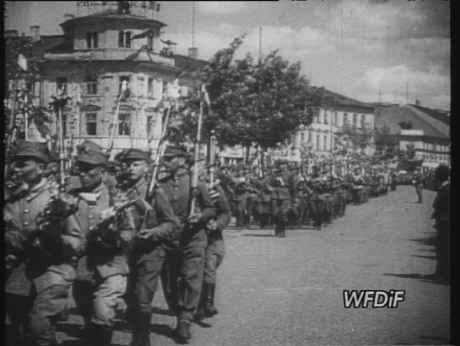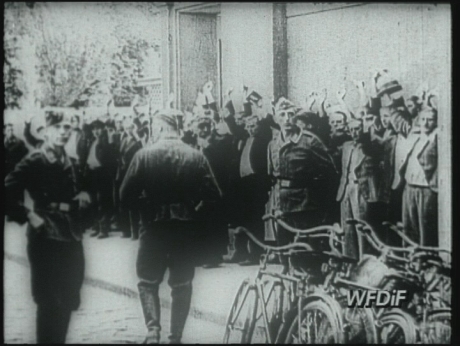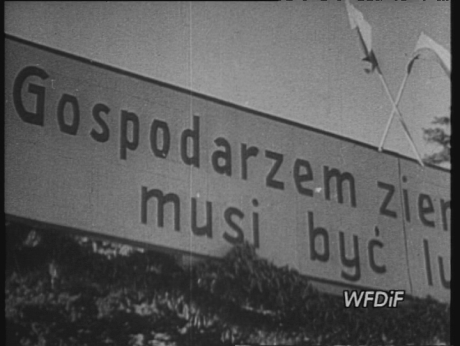
 overview
overview
Schleswig-Holstein. War activities. Defence.
| 00:00:02:00 | Elaborate title card with the caption: "TO THE MEMORY OF THE DEFENDERS OF WESTERPLATTE". |
| 00:00:10:20 | A ceremony in honour of the heroic defence of Westerplatte. |
| 00:00:18:13 | The Guard of Honour of the navy presents arms. |
| 00:00:24:14 | The red and white flag of Poland. |
| 00:00:29:00 | Explosions. |
| 00:00:32:12 | Artillery assault from the German battleship Schleswig-Holstein. |
| 00:00:40:10 | German planes drop bombs. |
| 00:01:01:12 | Explosions. |
| 00:01:01:20 | Shots from the German battleship Schleswig-Holstein. |
| 00:01:55:09 | Germany military ground assault. |
| 00:02:00:15 | The red and white flag of Poland. |

 reader text
reader text
The Polish nation paid tribute to the heroes of the Battle of Westerplatte, 6 years after the first German attack on Polish shores. This small peninsula in the port of Gdańsk, guarded by a mere 80 soliders, felt the full force of the German's breaking assault. At 4 am, before news of the outbreak of the war had been announced on radio, the first shot fell in Westerplatte. This spark started the fire which would ruinate Europe over the next 6 years. The Germans attacked with bombs, heavy artillery, a limited number of rifle companies, divisions of the SS in Gdańsk all (…) against a limited defence force in Westerplatte. The resistance to the German attack was bloody, and the naval artillery assault from the battleship Schleswig-Holstein was relentless. This first assault lasted for 7 long days. The Polish radio was the first to bring news of the Polish military defeats, and the collapse of various Polish fronts, and the only welcome news for Poles was that Westerplatte was still being held! While German attacks were successful in Łódź, Kielce and Kraków, the Polish people still rallied knowing that Westerplatte was being defended! The numbers of injured and wounded continued to rise, and the fierce assault from the battleship Schleswig-Holstein worsened the situation in Westerplatte. On September 7th the realisation was settling in that there was no way to help the wounded, with increasing numbers hobbled by gangrene, this front seemed certainly doomed. As word arrived of the German armoured assualt on Warsaw, another assault on Westerplatte started, and the Polish defenders held out with the last of their strength. As sixteen people were killed, half as many wounded, Westerplatte finally surrendered.











 previous
previous 







